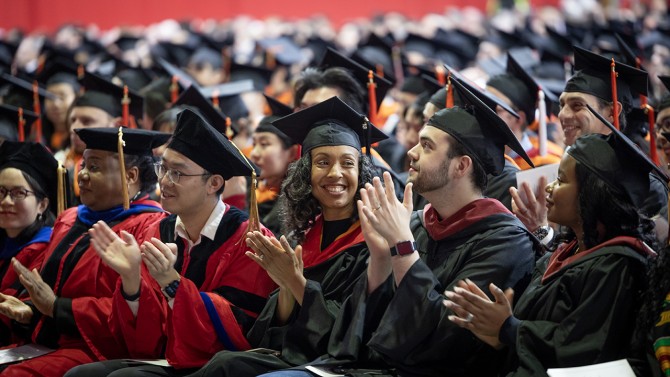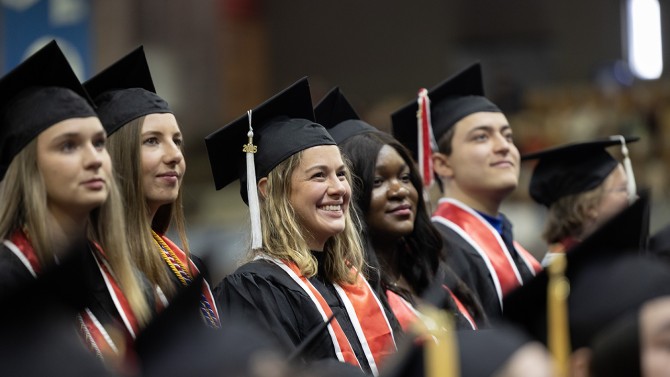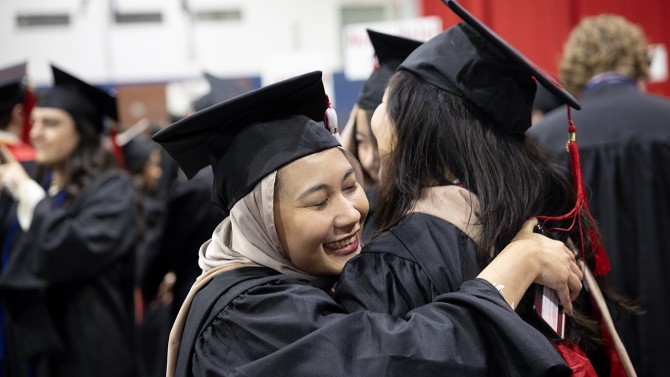
Interim President Michael I. Kotlikoff addressed the 500 graduates and nearly 2,000 guests in the Dec. 22 ceremony, held in Barton Hall.
December graduates charted their own course
By Melanie Lefkowitz, Cornell Chronicle
There’s something particularly Cornellian about December commencement.
“And by that I don’t just mean we have it when it is dark, gray and freezing cold outside,” said Interim President Michael I. Kotlikoff, addressing 500 graduates and nearly 2,000 guests at the university’s 22nd December Recognition Ceremony at Barton Hall on Dec. 22. “It’s that a December commencement, recognizing graduates who completed their degrees in August or December, celebrates Cornellians whose journeys didn’t necessarily follow a standard path.
“They sped on ahead or took some detours, encountered obstacles and found a way around them, or chose a new direction to explore,” Kotlikoff said. “Our graduates today are students who, in one way or another, did things a little differently: who charted a course with their own compass, instead of following someone else’s map.”
That was the case for Noah Courtney ’24, of Bel Air, Maryland, who transferred to Cornell in January 2023 from Harford Community College in Maryland, which he attended after being medically retired from the U.S. Coast Guard.
“I had a super non-traditional path,” said Courtney, a biological sciences major in the College of Agriculture and Life Sciences, with a minor in education. “The military prepared me well; I think community college did an excellent job preparing me. This has been an incredible two years – fast, but incredible.”
At Cornell, Courtney worked as a researcher in the lab of Michelle Smith, the Ann S. Bowers Professor and senior associate dean for undergraduate education in the College of Arts and Sciences, and he plans to pursue a Ph.D. at Texas Tech University.
He said he chose Cornell because of its reputation as a top school for veterans. He served as vice president of the Cornell Undergraduate Veterans Association and lived in the Veterans Program House.
“We have the best student veteran community in the country,” he said. “People are why I got here. Community is why I got here.”
Sahida Amadou Djibo ’24 summarized her path to graduating from Cornell as one of self-discovery.
“Being in Arts and Sciences, I liked being able to study what I wanted to study and also to explore outside of my major – I think it was the best thing about Cornell and it was exactly what I was looking for,” said Djibo, of Niger, who majored in economics and plans to attend graduate school.
Sinahy Fragoso-De la Paz ’23, M.Eng. ’24, of San Jose, California, who completed a bachelor’s degree in environmental engineering and a master’s degree in mechanical engineering in 4 ½ years, said that graduating felt surreal.
“I’m low-income and first-gen, so obviously I came here to challenge myself,” said Fragoso-De la Paz, who plans to work for a biotech company in California. “Cornell definitely challenges you in ways you can’t imagine, but I’m very, very grateful because it prepared me for the future, and I’m ready to go into the workforce.”
Cornell’s “personality” – and its reputation for rigor – was passed down by Ezra Cornell, Kotlikoff said in his speech, describing the university’s founder as “a tough-minded idealist who found his greatest joy in helping others, who wanted his students to find and pursue that joy, and who expected them to give the greatest return on his investment.
“You didn’t come to Cornell because it would be easy,” he said. “You came because you wanted a Cornell education: one that would push you and strengthen you, that would equip you for any challenge, that would enable you to contribute and prepare you to lead.”
In closing his speech, Kotlikoff recited the inscription on the side of the Andrew Dickson White Memorial Gate on Eddy Street, which once marked the border of campus: “So enter that daily thou mayest become more learned and thoughtful; so depart that thou mayest become more useful to thy country and mankind.”
“Today, as you depart, it is my hope that all of you will seek and find your own way,” Kotlikoff said, “a way that will be entirely your own, to be more useful to your countries and to humanity – and to do, in the words of Ezra Cornell, ‘the greatest good.’”
Media Contact
Get Cornell news delivered right to your inbox.
Subscribe



